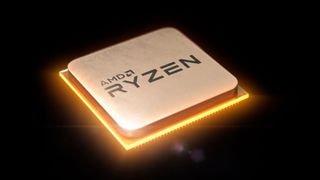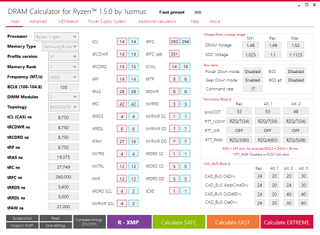
Yuri "1usmus" Bubliy, the creator behind the DRAM Calculator for Ryzen, has released version 1.5.0 of the popular tool, which brings numerous improvements, including its own integrated MEMBench benchmark and stability test based on MemTest from HCI.

Maximizing memory performance on the AMD Ryzen platform can be a long and mundane process. Thankfully tools like the DRAM Calculator for Ryzen have practically removed the guess work and complexity from the equation. While AMD is Bubliy's partner, the developer created the tool on his own. If you're not familiar with the software, DRAM Calculator for Ryzen automatically detects the installed memory modules and suggests optimized settings to get the most out of them.
Given the nature of Bubliy's relationship with AMD, the memory expert has shared some insights on AMD's forthcoming Ryzen 3000-series processors and corresponding high-end X570 chipset. He believes that DDR4-5000 will be the maximum configurable memory speed on the new breed of AMD motherboards. In retrospective, the very first AMD Ryzen motherboards debuted with a very low threshold in the DDR4-3000 to DDR4-3200 range. As the platform matured, the threshold was eventually increased. It goes without saying that it's mighty exciting to see Zen 2 with such a high memory threshold out of the gate.
While the new version of DRAM Calculator for Ryzen comes with multiple changes and bug fixes, the integrated benchmark and stability test are the features that stand out the most. The MEMBench benchmark allows you to evaluate and compare your system's existing and expected memory performance. On the other hand, HCI MemTest will test the stability of your memory overclock. HCI MemTest has become pretty much the authority on memory stability testing for DDR4 memory, so you'll be in good hands.
Version History v1.5.0.5 (May 7th, 2019)
- Fixed crash when you click "save settings" on Main tab
- Fixed error in the names (RRDS / RRDL), tab MEMbench
- Updated information in the tab "About"
- Fixed AFR save preset (3200-3333mhz)
Version History v1.5.0 (May 7th, 2019)
Main Changes
- Added feature to compare current system timings with recommended ones. Turns on with the button "Compare timings".
- Added the ability to select the topology of the motherboard. Sheet box with the name "Topology". The meaning of this undertaking is a more accurate prediction of procODT / RTT settings. Of course, the function is not perfect and with each update of the calculator the prediction accuracy will increase.
- Partially cleaned the "Main" tab of information that is not used and clutters the user interface. This is a small advance towards the ease of use of this application.
- SOC voltage prediction blocks have undergone significant changes for each generation of Ryzen processors.
- Another recommendation is temporarily added to the CAD_BUS block.
- Recycling of most presets for each type of memory. The reason is simple - new bios make new adjustments.
- Block "Misc items" received new prediction algorithms. In particular, the GDM prediction.
- Improved support for system configurations consisting of 4 DIMMs.
- Improved algorithm for calculating profiles "Debug".
- Corrections of sudden crash programs in the calculations.
- Fixed a problem when during the import of the html profile the memory type was automatically switched to Samsung b-die mode.
- Added button link to system setup guide using Ryzen DRAM Calculator. This button is located in the "Help" tab.
- Updated information in the "About" tab and added feedback to me via Twitter.
Key features of MEMbench
- Support for processors with 1 to 32 threads (temporary restrictions) .
- Error within 0.5%.
- Automatic determination of the number of threads in the system.
- Unified rating for desktop and HEDT processors (AMD and Intel).
- Qualitatively implemented multi-threading.
- Thanks to the HCI 6 kernel (freeware), this product is free for the end user. I also want to note that this version is not modified (does not contain hacks).
- Complete absence of the influence of the processor frequency on the benchmark result.
- The result is affected by each timing (picture with themes, see below).
- Ability to work in the mode of ordinary memory check with a fixed delayed stop at a certain stage and this stage is determined by you.
- Four presets for benching "Easy mode", "Default mode", "Custom mode" and "Memtest".
- Easy mode is designed specifically for systems with a small amount of installed RAM.
- Easy to use benchmark, you need to select only MEMbench mode and click "Run".
- Provision of full-fledged system information for the Ryzen processors (for Intel, the timing-determining block is not yet connected).
- Ability to save two own results for further comparison.
- Display information in the chart.
- A window-table with information about the current state of benching or memory checking.
- "Screenshot" Button
- All possible protection against situations of low memory in the system.
- Does not use swap file.
- Loyal stress CPU test in "Default mode".
Stay on the Cutting Edge
Join the experts who read Tom's Hardware for the inside track on enthusiast PC tech news — and have for over 25 years. We'll send breaking news and in-depth reviews of CPUs, GPUs, AI, maker hardware and more straight to your inbox.

Zhiye Liu is a Freelance News Writer at Tom’s Hardware US. Although he loves everything that’s hardware, he has a soft spot for CPUs, GPUs, and RAM.
Most Popular



